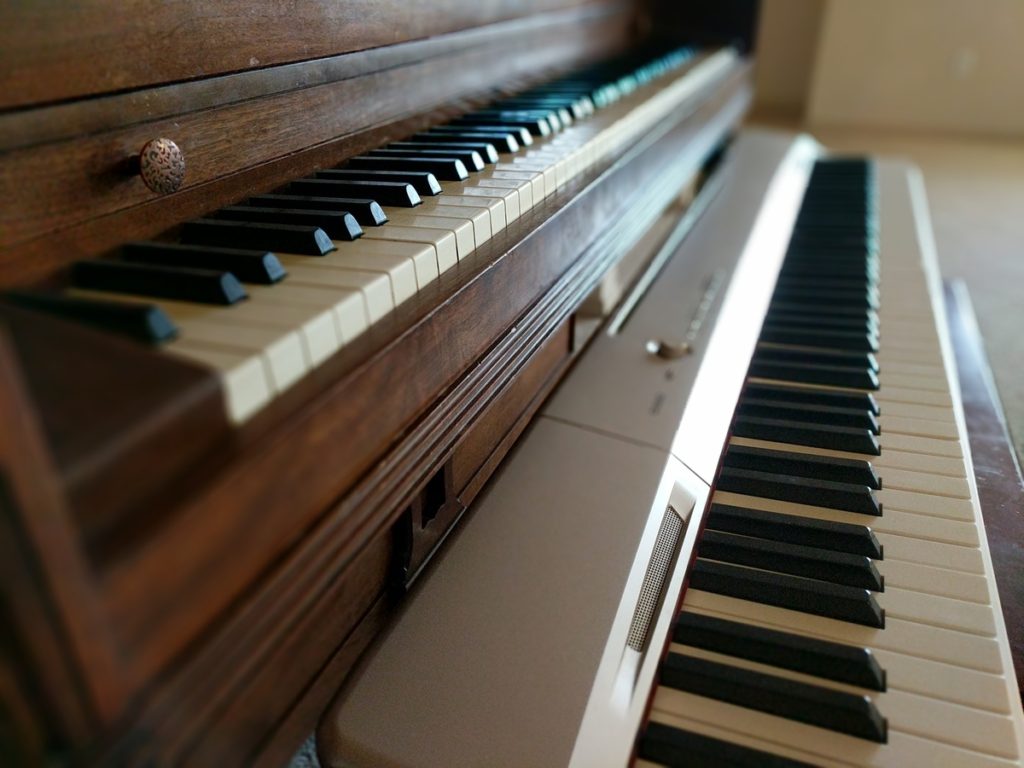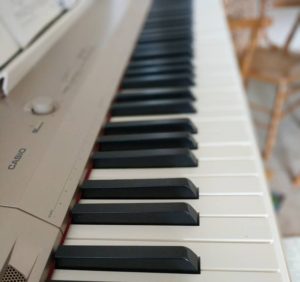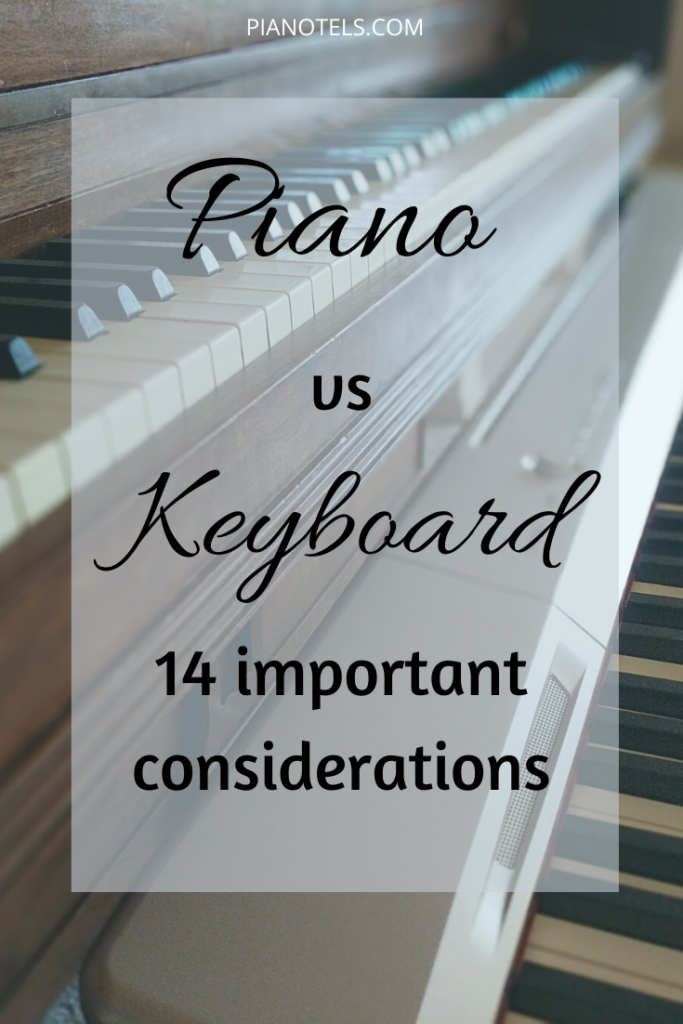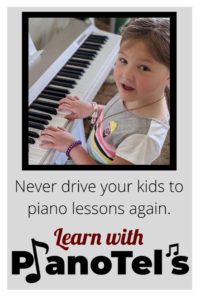This question of keyboard vs piano is one of the #1 questions of today when it comes to purchasing a piano. Having had several different kinds of keyboards AND a piano for several years now, I have had my chance to explore both options! Not only have I played around with them both, so have my four kids as well as dozens of piano students.
With so many options to purchase, what do we need to consider with keyboards vs acoustic pianos?

Consideration #1: Affordability
You can get a high quality, decent keyboard that is considered more of a “professional grade” for around $500. You will be hard pressed to find a piano for that price, unless you are buying used. Used pianos are risky, but you can do it as long as you know what to look for.
Consideration #2: Portability
A keyboard is portable. It is easy to put just about anywhere and can be moved around at your convenience. A piano is much more difficult to move. Once you place it in its designated area, you don’t want to move it around much more than that. Every time it’s moved, you need to tune it again.
Not to mention the pain it is when you move an acoustic piano. It takes about 3 men to move our piano around and its just an upright piano. And my husband is really strong too.
Consideration #3: Longevity
An acoustic piano can last for years and years, if maintained well and kept up. The keys and hammers can be replaced. Not taken care of well, it won’t last for nearly as long and the amount of work and money to put into it to replace those parts may not be worth it.
An electric piano or keyboard can last for many, many years as well. Some argue it will last longer than an acoustic piano. That’s hard to say for sure because electric pianos haven’t been around for quite as long as pianos, so it may be unfair to make that judgement on how long each would last in comparison with the other.
Consideration #4: Sound Quality
A piano most often will have superior sound to the keyboard. That is simply because the piano has a real hammer action with strings and a place for the sound to amplify. A keyboard, most often, is made with a recording of a piano’s sounds. Those recordings can be pretty dang close to the real thing, but it just isn’t quite the real thing.
But that feel, sound, and experience, is likely most appreciated by the pianist who is more advanced. A pianist who appreciates all the nuances and immediate reactions of an acoustic piano will likely not be a beginner in piano.
Consideration #5: Sound Volume
You can control the volume on a keyboard much easier with the twist of a knob or the push of a button. You can plug in headphones so that others don’t hear it at all.
A piano can put out quite a bit of volume. Although a keyboard can put out even more volume when it is plugged into a sound system.
Consideration #6: Hook-ups
A piano likely does not have additional features or ability to hook up to other things. But a keyboard may have some features that you might enjoy.
Consider the placement of the headphone jack and where you would find it more convenient to be.
Consider if it has a midi hook-up or a USB port. This can be convenient for online software and apps.
Consider if it has an audio output to plug into a sound system.
Consideration #7: Maintenance
A piano needs tuning, ideally at least once a year. A yearly piano tuning runs for at least a $100, usually more. Keeping it tuned and maintained will certainly give your piano greater longevity and make it sound the best. When a piano does break, though, you can usually fix it. You can get new keys, new pads and hammers, etc. As long as you are willing to pay for it.
Keyboards never go out of tune, so they never need tuning. But if something breaks on a keyboard, then it is much more difficult to replace and sometimes you just have end up getting a new keyboard because by the time you fix it, you have that much money into your keyboard that you could have put towards a new one.
Consideration #8: Technology
A keyboard has the capability to hook up to technology. The ability to hook your keyboard into apps is amazing and can potentially save you a lot of money and time trying to get the same benefits in other ways. Playing around with the apps, recording your music, and composing are all made much easier when you can just hook it up to the web with a chord.
Pianos can also be recognized by some apps and software, but that features isn’t as widely available as it would be for a digital piano. You also need to be able to have the technology move to the piano since the piano can’t move to the technology.
Consideration #9: Hammer Action
A piano has real hammer action. What that means is that there is a part of the piano that actually hits a string with a hammer and creates the sound. Keyboards, most often, are recordings of a piano making those sounds. So there isn’t any hammer action in a keyboard.
Because of this, of course the sound will be slightly different simply because one is the real thing while the other is a recording of it. Keyboards can do a pretty good job of imitating the sound of a piano though!
This also means that the push of a keyboard’s keys don’t always imitate the piano’s. Unless it specifically features “fully weighted keys” or a “graded hammer action” of some sort, the keys will push much easier than a piano’s and will not have the same effect.
Consideration #10: Space
A keyboard can be stored away, a piano can’t. A piano can take up quite a bit of room. A keyboard with the full set up (console and everything) may take up about as much room as a piano.
Consideration #11: Size of the Key
A keyboard does not always come with full-sized keys that always come on a piano. What I mean by this is that the key itself is skinnier than a normal piano key.
Smaller, skinnier keys present several problems. One problem is that your hands will never quite fit on the keyboard like it ought to. The fingers will become squished and will become trained in the wrong way. Not a good way to start out on the piano.
Another issue with this is that the fingers won’t have the proper training for reaching for other keys. When you play a chord, an interval, a scale, an arpeggio….practically any new key, the fingers won’t learn how far to stretch or where to put it because the keys are positioned the right distances from each other!
Consideration #12: Keyboard Length
A piano has 88 keys. A keyboard can have a full 88 keys or there are many keyboards that have less than that. While you won’t be using all the keys at the beginning, you will use them and sooner than you think. It doesn’t take long before you are playing an octave higher and an octave lower and nothing is worse than realizing you can’t play all the keys.
I would suggest a full 88 keys, although you could probably do just fine on a keyboard of 76 keys. I would worry about getting a keyboard with 61 keys because you would be limited on what songs you could play.
Consideration #13: Online Piano Learning
A keyboard allows you to hook up to a lot of online learning through apps and software. If this is important to you, often a keyboard will be much more convenient for online learning. A midi hookup allows for some additional features in some of your online learning software.
But some software will recognize an acoustic piano as much as an electric piano. So it may not be a factor.
Consideration #14: Features
Electric pianos have a lot of additional features that they can offer:
A keyboard will almost always have the ability to record and playback.
A keyboard will often have other recordings of songs to play at will.
A keyboard could have background accompaniment as you jam out.
A keyboard almost always has additional sounds that you can create, such as an organ, strings, jazz piano, etc. I use this feature often as I practice the organ. I play the organ in church and it is much more convenient for me to practice right in my own home as I turn that feature on with my keyboard. Otherwise, I would be taking trips back and forth to the church for my practices.
There are lots of other additional features that can be found on a keyboard. Each is a little different, so you will want to familiarize yourself with those features and what you find most important to you.
The keyboard I have fallen in love with
In case you were wondering, my absolute favorite item I have ever bought for myself has been my Casio Privia PX-160. After doing a lot, and a lot, and lot of research and reading a ton of reviews (you can see that all here in my article on the Casio), I felt pretty confident it would make me happy. And it has done that and more.

My Casio — I chose the gold color because I liked how it looked.
I love my Casio. The sounds quality is awesome, it has all the features I was looking for, and it is affordable. I am not the only one who has found their true love. It really is probably the most popular keyboard across the board.
If you are going to get the electric piano gear, you can check out my recommended pedal, stand, and piano bench by clicking on my article on electric piano necessities.
Related Questions:
Is playing piano and keyboard the same? Every single piano and keyboard will all have a difference to them. You can play different pianos and they will feel different. You can play different keyboards and they will all have a different feel. So no, you will never quite have the same experience on a piano and a keyboard.
Is a keyboard good for learning piano? Yes, with weighted keys, and an 88 full sized keyboard, a keyboard is a great way for learning piano! It will provide you with just about everything an acoustic piano would provide you. Keyboards are also a lot of fun to begin learning piano on because of all its extra features.

Tel loves her life as a piano player, a piano teacher, and a mom. Amid piano blogging, piano teaching, and piano playing, she loves a chance to fit in a good exercise class, volunteer at her kids’ school and at her church, and go on long dates with her husband. Full bio at About Tel.


